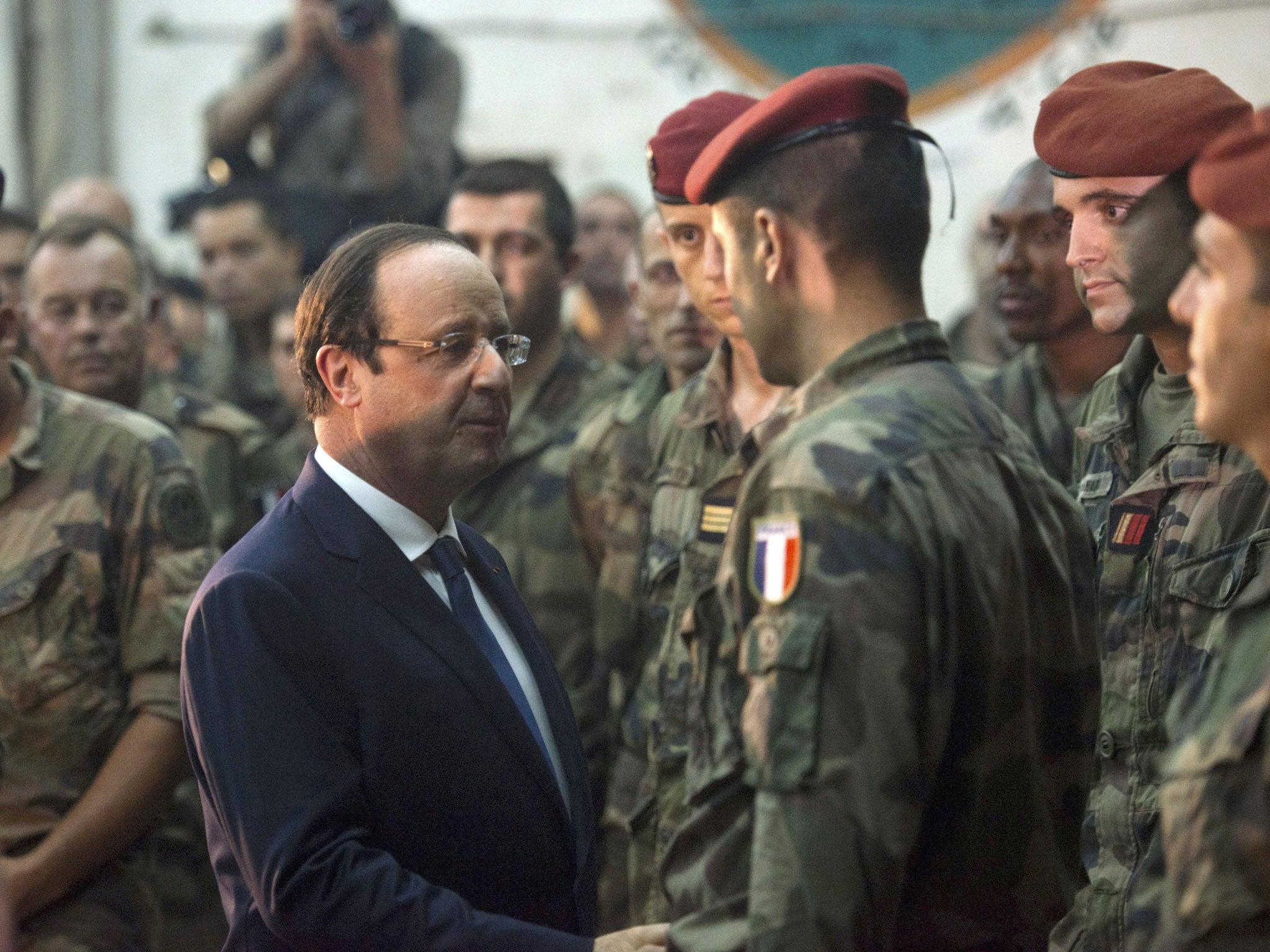Mission will continue, says François Hollande as he flies in to war-torn Central African Republic
Five hundred have died in clashes between Muslims and Christians over the last week

Your support helps us to tell the story
From reproductive rights to climate change to Big Tech, The Independent is on the ground when the story is developing. Whether it's investigating the financials of Elon Musk's pro-Trump PAC or producing our latest documentary, 'The A Word', which shines a light on the American women fighting for reproductive rights, we know how important it is to parse out the facts from the messaging.
At such a critical moment in US history, we need reporters on the ground. Your donation allows us to keep sending journalists to speak to both sides of the story.
The Independent is trusted by Americans across the entire political spectrum. And unlike many other quality news outlets, we choose not to lock Americans out of our reporting and analysis with paywalls. We believe quality journalism should be available to everyone, paid for by those who can afford it.
Your support makes all the difference.François Hollande has become the first French president for two decades to fly into a warzone, making a stopover in the anarchic Central African Republic on his way home from Nelson Mandela's memorial ceremony.
President Hollande arrived less than a day after the deaths of two French paratroopers and as aid workers reported that the death toll from violence between Muslims and Christians in the last week had exceeded 500.
Arriving at Bangui airport for talks President Michel Djotodia, Mr Hollande said that the 1,600 strong French intervention force deployed on Saturday would pursue its efforts to prevent a full-scale, genocidal civil war.
“The situation has not changed,” Mr Hollande said. “We knew that this was a dangerous mission. It will continue because it must continue if carnage is to be avoided.”
The two French paratroopers were killed by a burst of automatic fire late on Monday night as they a patrolled one kilometre from the airport where Mr Hollande arrived. There is no precedent in the 60 years of the French Fifth Republic for a head of state visiting a foreign country while a French armed intervention is still in progress.
Mr Hollande's visit was compared by the French media to President Francois Mitterrand's decision to visit the besieged Bosnian city of Sarajevo in 1992.
Although the arrival of French troops briefly calmed the violence at the weekend, communal tit-for-tat violence exploded once again. A Christian mob set fire to a mosque in the Fou neighborhood of Bangui in retaliation for the apparently random murder, rape and pillaging of the mainly muslim Seleka (alliance) rebels in recent days.
In other parts of the city Seleka forces had re-emerged onto empty streets after lying low since the French force arrived. The French soldiers, and a 2,300 strong multinational African force, is supposed to disarm the rebels but aid workers said that there was no sign of the Seleka fighters surrendering without a fight.
The French paratroopers were part of a patrol ambushed by a group of five to ten men. The loss of two soldiers so early in the operation is a substantial blow to France. Only seven French soldiers have died in the nearly 12-months old intervention against Islamist rebels in Mali, which is still going on.
The political and civil structures of the Central African Republic collapsed after Muslim rebels, including many fighters from Sudan and Chad, installed President Djotodia in March. Although de facto a “Muslim” versus “Christian” conflict, the motives of the rebels appear more sectarian and avaricious than religious or political. President Djotodia rapidly lost control of his forces who have been accused of a series of savage attacks on Christian civilians.
Half the 4,800,000 population is said to be in need of humanitarian aid. Over 1,000,000 people face severe food shortages or famine.
Central Africa, a French colony until 1960, is one the poorest countries in the world There have long been religious and economic tensions between the minority Muslims, who are traditionally live-stock farmers, and wealthier and more populous Christians, who are mostly crop-growers. There has never before, however, been sustained violence between the two groups.
Join our commenting forum
Join thought-provoking conversations, follow other Independent readers and see their replies
Comments